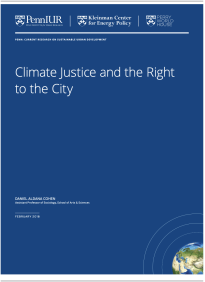Key Message
To effectively address the twin challenges of climate change and urban inequality, cities must adopt policies that integrate climate justice with the right to the city. This involves prioritizing affordable housing and equitable access to urban services, which are essential for both reducing greenhouse gas emissions and enhancing resilience to climate-linked disasters. Policymakers should work closely with community-based groups and social movements to ensure that climate policies do not exacerbate social inequalities. Instead, they should focus on creating inclusive urban environments that support sustainable development and improve the quality of life for all residents. This approach not only aligns with global sustainability goals but also strengthens the social and political fabric of cities, making them more resilient and equitable in the face of climate change.


